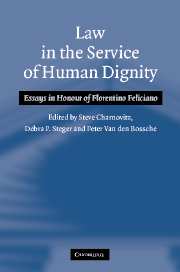Book contents
- Frontmatter
- Contents
- List of contributors
- Preface
- Biographical note
- List of abbreviations
- PART I Reflections on the contributions of Florentino Feliciano to international law
- PART II Insights into the World Trade Organization
- 5 Justice Feliciano and the WTO environmental cases: laying the foundations of a ‘constitutional jurisprudence’ with implications for developing countries
- 6 International trade law, human rights and theories of justice
- 7 Developing countries and the international trading system
- 8 North–South issues of foreign direct investments in the WTO: is there a middle-of-the-road approach?
- 9 The participation of developing countries in WTO dispute settlement and the role of the Advisory Centre on WTO Law
- 10 Reform of the WTO dispute settlement system: what to expect from the Doha Development Round?
- 11 Interpretation and Application of WTO Rules: Florentino Feliciano and the First Seven
- 12 Dispute settlement in the WTO: on the trail of a court
- 13 A proposal to introduce an Advocate General's position into WTO dispute settlement
- 14 Arbitration at the WTO: a terra incognita to be further explored
- 15 The challenges to the legitimacy of the WTO
- 16 The World Trade Organization after Cancún
- PART III The changing landscape of investment arbitration
- PART IV New challenges in international adjudication
- Bibliography of works by Florentino Feliciano
- Index
11 - Interpretation and Application of WTO Rules: Florentino Feliciano and the First Seven
from PART II - Insights into the World Trade Organization
Published online by Cambridge University Press: 29 July 2009
- Frontmatter
- Contents
- List of contributors
- Preface
- Biographical note
- List of abbreviations
- PART I Reflections on the contributions of Florentino Feliciano to international law
- PART II Insights into the World Trade Organization
- 5 Justice Feliciano and the WTO environmental cases: laying the foundations of a ‘constitutional jurisprudence’ with implications for developing countries
- 6 International trade law, human rights and theories of justice
- 7 Developing countries and the international trading system
- 8 North–South issues of foreign direct investments in the WTO: is there a middle-of-the-road approach?
- 9 The participation of developing countries in WTO dispute settlement and the role of the Advisory Centre on WTO Law
- 10 Reform of the WTO dispute settlement system: what to expect from the Doha Development Round?
- 11 Interpretation and Application of WTO Rules: Florentino Feliciano and the First Seven
- 12 Dispute settlement in the WTO: on the trail of a court
- 13 A proposal to introduce an Advocate General's position into WTO dispute settlement
- 14 Arbitration at the WTO: a terra incognita to be further explored
- 15 The challenges to the legitimacy of the WTO
- 16 The World Trade Organization after Cancún
- PART III The changing landscape of investment arbitration
- PART IV New challenges in international adjudication
- Bibliography of works by Florentino Feliciano
- Index
Summary
In this chapter I try to look with the eyes of a historian at the first years of the Appellate Body. Specifically, I will examine how the rules on interpretation applicable to WTO law were implemented, and further developed, in the first cases before the Appellate Body. I will also examine the drafting of the Working Procedures for Appellate Review (‘Working Procedures’). As decisions in specific appeals, the rules on interpretation and the Working Procedures were the result of the ‘collective thinking’ and of intense discussions among all seven Appellate Body members leading to a consensus view.
The first members of the Appellate Body were appointed by the Dispute Settlement Body of the WTO in November 1995. Florentino Feliciano was one of the seven. As he is the person to whom we render homage in this book, I feel that some words about him in particular are appropriate before I broach the general subject of this chapter. Who is Florentino Feliciano? Who is the man behind the portrait drawn by the biographical note appearing on the WTO website? What events and facts shaped his personality? How did this personality affect the ‘collective thinking’ of the Appellate Body?
I knew of Florentino Feliciano and his life through his writings, although I did not have the privilege of meeting him until I took up my function of Appellate Body member.
- Type
- Chapter
- Information
- Law in the Service of Human DignityEssays in Honour of Florentino Feliciano, pp. 127 - 135Publisher: Cambridge University PressPrint publication year: 2005



